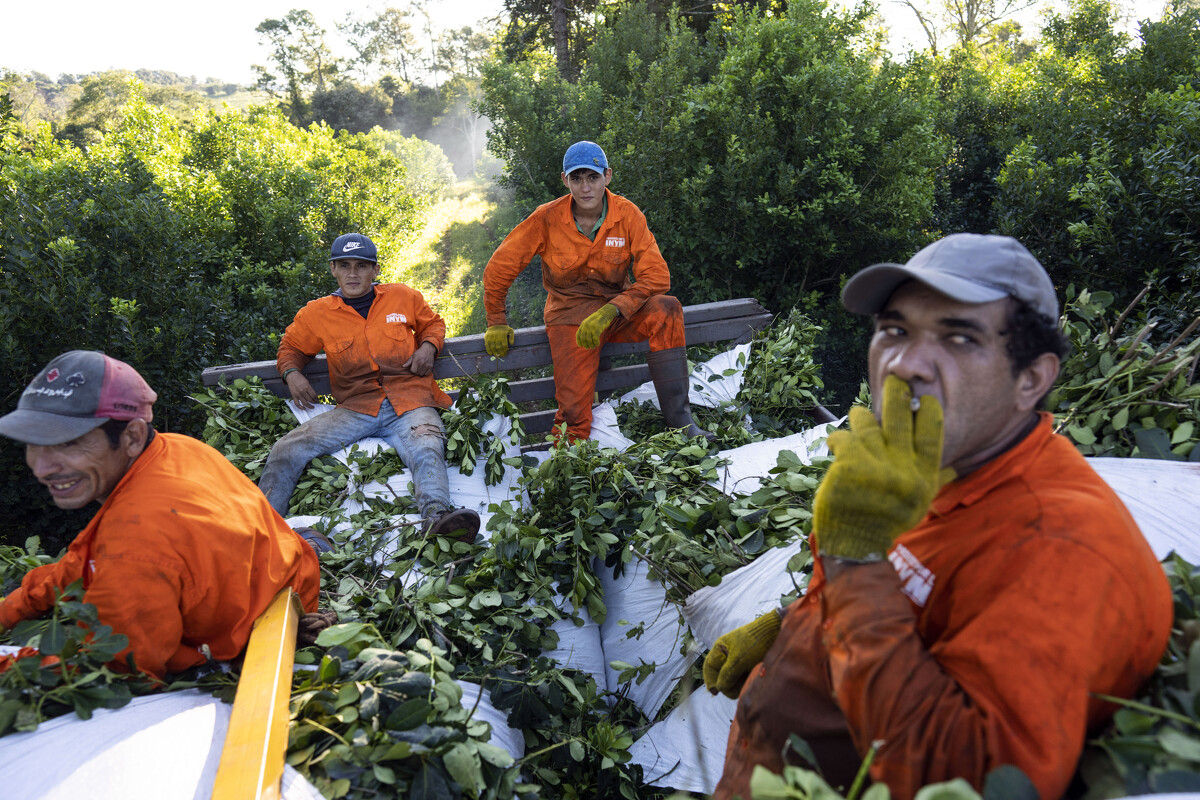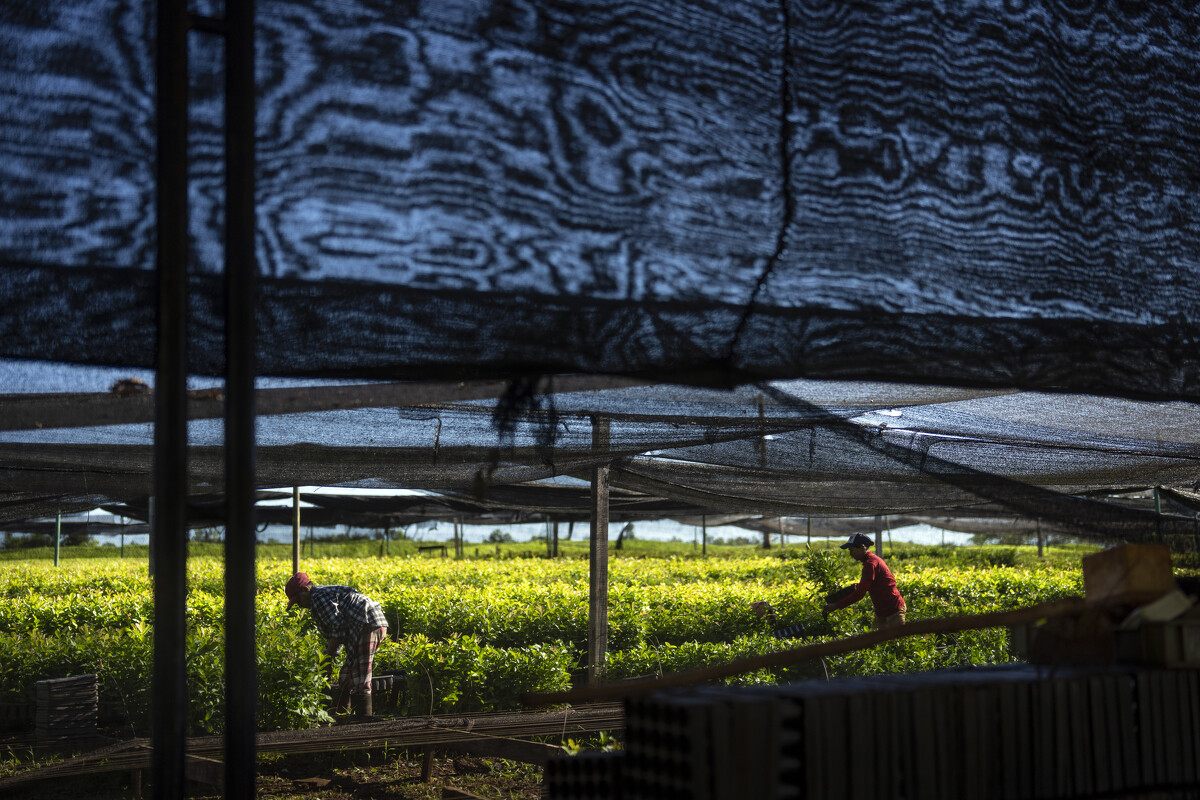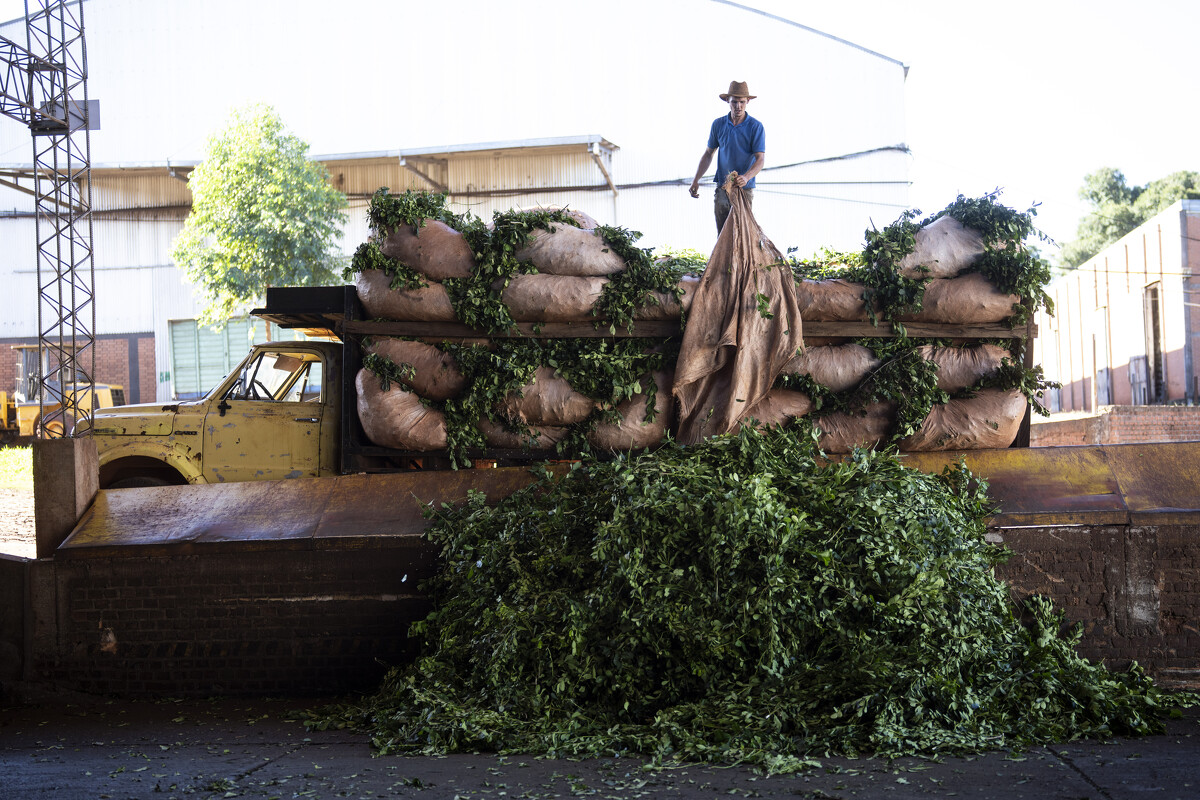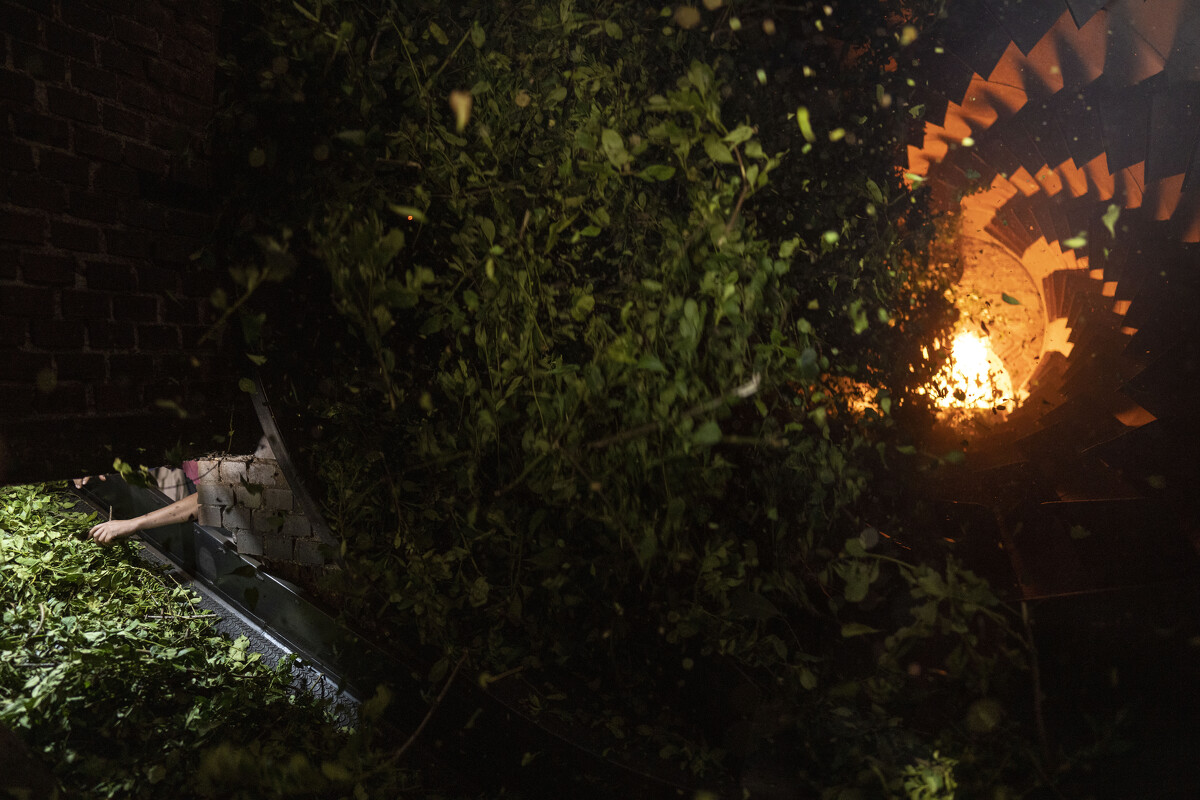
Leonardo Favio Correa carries yerba mate to a truck in Andresito, in Argentina's northeast Misiones Province, Wednesday, April 17, 2024. Beneath the earthy drink's mythical quality is grueling work, first performed by Indigenous tribes on Jesuit settlements in what is now Paraguay and today by low-paid laborers known as "tareferos," in the steamy grasslands of Argentina's northeast Misiones Province, center of the world's maté production. (AP Photo/Rodrigo Abd)
ANDRESITO, Argentina (AP) - For millions across the heartland of South America, bitter-tasting yerba mate tea is a beloved staple of social gatherings and morning routines. But here, in the steamy grasslands of Argentina's northeast Misiones Province, mate is also a way of life - literally.
For generations, low-paid laborers known as "tareferos" have toiled in the forests of Misiones, the mate capital of the world. They get paid by the weight, so each morning, the race is on. From dawn to sundown, they cut a seemingly endless harvest of the hardy leaves and stuff them into white bags until they burst at the seams. After being dried, packaged and trucked off, the herbs spread to virtually every Argentine household, office and school - as well as to neighboring Brazil, Paraguay, Uruguay and farther afield.

Workers ride on their bags of harvested yerba mate in Andresito, in Argentina's Misiones Province, Wednesday, April 17, 2024. Beneath the earthy drink's mythical quality is grueling work, first performed by Indigenous tribes on Jesuit settlements in what is now Paraguay and today by low-paid laborers known as "tareferos," in the steamy grasslands of Argentina's northeast Misiones Province, center of the world's maté production. (AP Photo/Rodrigo Abd)

Harvested yerba mate leaves are unloaded at the Andresito Cooperative in Andresito, in Argentina's Misiones Province, Thursday, April 18, 2024. For decades Argentina's government has supported the industry with price controls and subsidies, but to fix Argentina's financial crisis, President Javier Milei seeks to scrap regulations affecting a range of markets, including yerba maté. (AP Photo/Rodrigo Abd)
For tareferos, mate is mostly a commodity, sold for $22 a ton. But workers also sip the infusion during breaks in the fields, its caffeine helping them stay energized. The grueling work in northeastern Argentina dates back to the arrival of the Spanish, when Indigenous tribes worked Jesuit plantations in what is now Paraguay.
"Yerba mate gives us harmony and strength," said Isabelino Mendez, an Indigenous village chief in Misiones. "It's part of our culture."
Argentina's government has long supported the mate industry with price controls and subsidies, keeping farmers' incomes higher than they would be if subjected to free-market competition.
But this year, libertarian President Javier Milei's draconian financial measures to fix the economy have thrust mate producers and tareferos alike into uncertainty. To downsize the state, Milei seeks to scrap price controls and other regulations affecting a range of markets, including yerba mate.

Margarita Mendez, front left, drinks mate as her friend Cristina Chamorro breastfeeds in a a home's outdoor kitchen in the Guaraní Indigenous community of Kaaguy Pora II, on the outskirts of Andresito, in Argentina's Misiones Province, the center of the world's maté production, Thursday, April 18, 2024. Yerba bate is found in almost every Argentine household. (AP Photo/Rodrigo Abd)

Women arrange yerba mate plants inside a nursery in Andresito, in Argentina's Misiones province, Thursday, April 18, 2024. For decades Argentina's government has supported the industry with price controls and subsidies, but to fix Argentina's financial crisis, President Javier Milei seeks to scrap regulations affecting a range of markets, including yerba maté.(AP Photo/Rodrigo Abd)
Small producers fear that big companies will set prices they can't afford to match and push them out of the market.
Julio Petterson, a mate producer from the northern Andresito village, fears a repeat of the 1990s, when similar liberal policies wreaked havoc on small producers. "We barely survived," he said. "Thousands of other producers went bankrupt."
Workers say they're bracing for mass layoffs.
"If the government deregulates prices, this will harm the producers who own the land and, ultimately, we'll lose our jobs," said 40-year-old Antonio Pereyra Ramos, who oversees 18 workers. "The economic crisis is hitting us hard."

A girl plays under a monument of Andres Guacurarí, an Indigenous Guarani soldier who governed the Greater Province of the Misiones (1815 - 1819) in Andresito, in Argentina's Misiones Province, Thursday, April 18, 2024. Argentina's Misiones Province is the center of the world's maté production and was first harvested by Indigenous tribes. (AP Photo/Rodrigo Abd)

Machetes of yerba mate foreman Antonio Francisco Pereyra lay inside his pick-up truck as he drives to deliver weekly payments to his crew in Andresito, in Argentina's Misiones province, Friday, April 19, 2024. For decades Argentina's government has supported the yerba mate industry with price controls and subsidies, but to fix Argentina's financial crisis, President Javier Milei seeks to scrap regulations affecting a range of markets, including yerba maté. (AP Photo/Rodrigo Abd)

Workers carry bags of dried yerba mate, called yerba "canchada," at the Andresito Cooperative in Andresito, in Argentina's Misiones province, Thursday, April 18, 2024. For decades Argentina's government has supported the industry with price controls and subsidies, but to fix Argentina's financial crisis, President Javier Milei seeks to scrap regulations affecting a range of markets, including yerba maté. (AP Photo/Rodrigo Abd)

Workers load harvested yerba mate leaves on a truck in Andresito, in Argentina's Misiones Province, Wednesday, April 17, 2024. Beneath the earthy drink's mythical quality is grueling work, first performed by Indigenous tribes on Jesuit settlements in what is now Paraguay and today by low-paid laborers known as "tareferos," in the steamy grasslands of Argentina's northeast Misiones Province, center of the world's maté production. (AP Photo/Rodrigo Abd)

Yerba mate foreman Antonio Francisco Pereyra drives with his four-year-old son Facundo under his arm, to deliver weekly payments to his crew in Andresito, in Argentina's Misiones province, Friday, April 19, 2024. For decades Argentina's government has supported the yerba mate industry with price controls and subsidies, but to fix Argentina's financial crisis, President Javier Milei seeks to scrap regulations affecting a range of markets, including yerba maté. (AP Photo/Rodrigo Abd)

Morning dew moistens yerba mate leaves in Andresito, in Argentina's northeast Misiones Province, Thursday, April 18, 2024. The dried leaves inside a gourd with hot water create a powerful elixir that has quenched South America's thirst for caffeine and community for centuries. (AP Photo/Rodrigo Abd)

A worker unloads harvested yerba mate at the Andresito Cooperative in Andresito, in Argentina's Misiones Province, Thursday, April 18, 2024. For decades Argentina's government has supported the industry with price controls and subsidies, but to fix Argentina's financial crisis, President Javier Milei seeks to scrap regulations affecting a range of markets, including yerba maté. (AP Photo/Rodrigo Abd) (AP Photo/Rodrigo Abd)

Yerba mate leaves are tossed about inside a rotating oven, as a worker, left, spreads the dried leaves on a conveyor belt after they pass through the oven at the Andresito Cooperative, in Andresito, in Argentina's Misiones Province, Thursday, April 18, 2024. For decades Argentina's government has supported the yerba mate industry with price controls and subsidies, but to fix Argentina's financial crisis, President Javier Milei seeks to scrap regulations affecting a range of markets, including yerba maté. (AP Photo/Rodrigo Abd)

A worker operates an oven that dries yerba mate at the Andresito Cooperative, in Andresito, in Argentina's Misiones, Thursday, April 18, 2024. For decades Argentina's government has supported the industry with price controls and subsidies, but to fix Argentina's financial crisis, President Javier Milei seeks to scrap regulations affecting a range of markets, including yerba maté. (AP Photo/Rodrigo Abd)

A road in Andresito, in Argentina's Misiones Province, Wednesday, April 17, 2024. The steamy grasslands of Argentina's northeast Misiones Province is the center of the world's maté production. (AP Photo/Rodrigo Abd)

Yerba mate producer Julio Petterson takes a work call at home where his daughter Kiara Isabella plays on a toy tractor in Andresito, in Argentina's Misiones Province, Wednesday, April 17, 2024. "We barely survived," said Petterson, referring to policies that devastated the yerba mate industry in the 1990s. (AP Photo/Rodrigo Abd)

A worker carries a bags of dried yerba mate, called yerba "canchada," at the Andresito Cooperative in Andresito, in Argentina's Misiones province, Thursday, April 18, 2024. For decades Argentina's government has supported the industry with price controls and subsidies, but to fix Argentina's financial crisis, President Javier Milei seeks to scrap regulations affecting a range of markets, including yerba maté. (AP Photo/Rodrigo Abd)

Wearing an Argentine soccer jersey, Fabian Acuna counts his weekly payment for harvesting yerba mate outside his home where the foreman drove to drop off his payment in Andresito, in Argentina's Misiones Province, Friday, April 19, 2024. Rich or poor, left or right, fan of Argentine soccer club Boca Juniors or its fierce rival River Plate, Argentines run on maté. (AP Photo/Rodrigo Abd)

Workers wrap harvested yerba mate into a hauling bag in Andresito, in Argentina's Misiones province, Wednesday, April 17, 2024. Beneath the earthy drink's mythical quality is grueling work, first performed by Indigenous tribes on Jesuit settlements in what is now Paraguay and today by low-paid laborers known as "tareferos," in the steamy grasslands of Argentina's northeast Misiones Province, center of the world's maté production. (AP Photo/Rodrigo Abd)